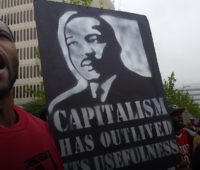Jean Beaman presents some of her research into race and police violence, and the response to such violence, in France. Explicitly putting recent French incidents and patterns in comparative perspective with those involving law enforcement and African Americans in the United States, Beaman finds some similarities and many differences in how social mobilization against police violence is framed and carried out. In particular, she focuses on how French republicanism makes it more difficult to organize around claims based on the status of marginalized social identities (black, Muslim) as compared to the role played by BlackLivesMatter in the United States.























